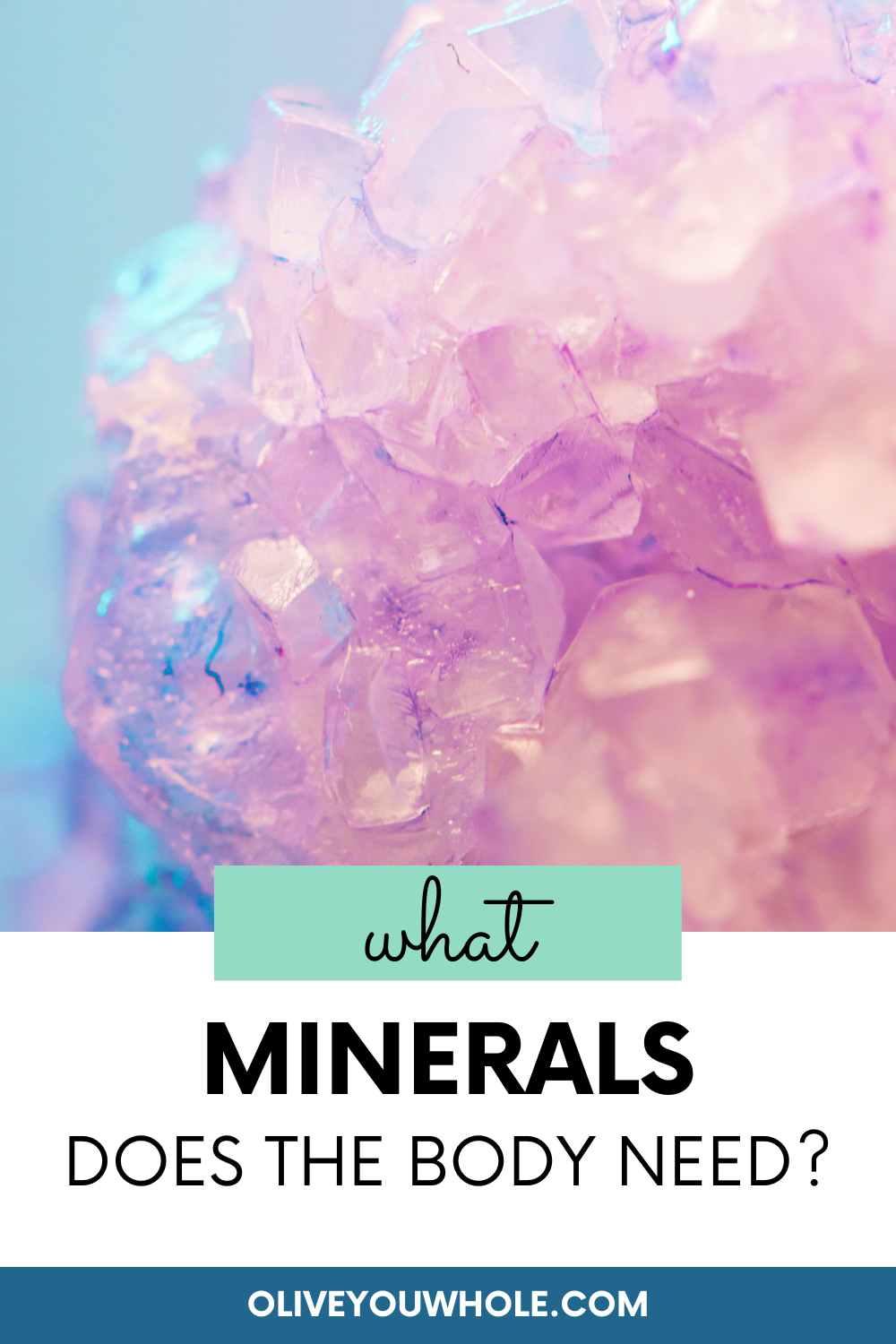As a health coach, I get the question a lot “What minerals does the body need?” In the intricate web of the human body, minerals play a pivotal role, acting as the unsung heroes that support various bodily functions. These essential nutrients are the building blocks of life, influencing everything from bone strength to nerve function. In this comprehensive guide that answers the question “What minerals does the body need?,” we will delve into the world of minerals, exploring their diverse roles and the vital contributions they make to our overall wellbeing. We will unlock the mysteries of essential minerals to figure out what your body needs to thrive!
Understanding Essential Minerals:
The human body requires a spectrum of minerals to function optimally. Minerals are inorganic nutrients that are essential for various bodily functions. An “essential” nutrient is “a nutrient required for normal body function that either cannot be made by the body or cannot be made in amounts adequate for good health and therefore must be provided by the diet.”(1) These minerals can be broadly categorized into two groups: macrominerals and trace minerals. [Today, we’ll be focusing on macrominerals.]
What are Macrominerals?
Macrominerals are needed needed in larger amounts in the body, and they include calcium, phosphorus, magnesium, sodium, potassium, chloride, and sulfur.
What are Trace Minerals?
Differing from Macro Minerals, trace minerals, required in smaller quantities, encompass iron, zinc, copper, manganese, iodine, selenium, and others.
Minerals and Electrolytes:
Sometimes people use the term “electrolytes” instead of “minerals.” I know it can seems confusing! That’s because electrolytes are minerals in your body that have an electric charge. They play a crucial role in maintaining various physiological functions, including nerve function, muscle contractions, fluid balance, and pH regulation. Common electrolytes include sodium, potassium, calcium, magnesium, chloride, phosphate, and bicarbonate.
A Look at List of Minerals:
1. Calcium: The Foundation of Strong Bones and Beyond
Calcium is often synonymous with bone health, and rightly so. This mineral is a key component of bone structure, contributing to their strength and density. However, calcium is not confined to bone health alone; it plays a crucial role in muscle contraction, blood clotting, and nerve function. The Mayo Clinic says that calcium, combined with Vitamin D, could protect against cancer, diabetes, and high blood pressure. (2) Dairy products (we prefer raw dairy!), leafy greens, and fortified foods are excellent sources of calcium. It’s important to note that Vitamin D3 is critical for calcium absorption, and Vitamin K2 is critical for Vitamin D3 absorption.
2. Iron: The Oxygen Carrier
Iron is essential for the production of hemoglobin, the protein responsible for carrying oxygen in red blood cells. Anemia, characterized by fatigue and weakness, is a common consequence of iron deficiency. Sources of iron include red meat (we prefer Organic, grass-fed), poultry (Organic, pasture-raised), fish (Organic, wild), and plant-based options like lentils and spinach.
3. Magnesium: Nature’s Relaxation Mineral
Magnesium is a multifaceted mineral involved in over 300 biochemical reactions in the body. According to one of my favorite Supplement companies Thorne, “According to World Health Organization statistics, as much as 75% of the U.S. adult population does not meet the U.S. Food and Drug Administration’s Recommended Daily Intake of 420 mg.” (3) It supports muscle and nerve function, regulates blood pressure, and contributes to bone health. (4) Foods rich in magnesium include nuts, seeds, whole grains, and leafy greens.
4. Zinc: The Immune Booster
Zinc is a vital player in immune function, metabolism, wound healing, and DNA synthesis. (5) This trace mineral is found in various foods, such as meat, dairy products, nuts, and legumes. Maintaining adequate zinc levels is crucial for overall immune resilience.
5. Selenium: A Powerful Antioxidant
Selenium acts as an antioxidant, defending the body against oxidative stress and inflammation. It is important for reproduction, thyroid hormone metabolism, and DNA synthesis. (6) Brazil nuts, fish, poultry, and whole grains are excellent sources of selenium.
6. Potassium: Electrolyte Balance for Heart Health
Potassium is a key electrolyte that helps regulate fluid balance inside of cells, while sodium maintains fluid levels outside of cells. It also plays a regulatory role in muscle contractions and nerve signals. It is particularly important for maintaining a healthy heart rhythm and supports normal blood pressure. (7) Dietary sources of potassium are dried fruits like raisins and apricots, beans and lentils, potatoes, bananas, oranges, and leafy greens like spinach and broccoli.
7. Sodium: The Blood Balancer
Potassium and sodium go hand in hand. Like I mentioned above, sodium maintains fluid levels outside of cells. Sodium is necessary in the body. Medline Plus says “The body uses sodium to control blood pressure and blood volume. Your body also needs sodium for your muscles and nerves to work properly.” (10) One of my favorite Electrolyte companies LMNT says “A growing body of research reveals that optimal health outcomes occur at sodium levels 2-3x government recommendations. That’s why we say, More Salt, Not Less.” (11)
8. Iodine: Essential for Thyroid Function
Iodine is a crucial component for making thyroid hormones, which regulate metabolism. (8) Seaweed, fill and shellfish (wild), beef liver (Organic and 100% Grass-Fed), chicken (Organic and pasture-raised), and dairy products (we prefer raw!) are good sources of iodine. (9) Insufficient iodine intake can lead to thyroid disorders, affecting energy levels and overall wellbeing.
9. Copper: Supporting Connective Tissues
Copper is involved in the formation of collagen, a key component of connective tissues and skin. It also plays a role in iron metabolism. Nuts, seeds, whole grains, and organ meats (like beef liver) are good sources of copper.
Dosage of Minerals
It’s important to note that individual needs of minerals can vary, and dietary requirements depend on factors like individual health, age, sex, health status, activity level, and environmental conditions. If you have specific concerns about your mineral intake, it’s advisable to consult with a healthcare professional or a registered dietitian.
Wrapping up “What minerals does the body need?”
In the intricate dance of human physiology, minerals serve as the choreographers, orchestrating various bodily functions to ensure optimal health. While the body requires these minerals in varying amounts, their collective impact is undeniable. A balanced and diverse diet, rich in nutrient-dense foods, is the key to meeting these mineral needs. By understanding the roles each mineral plays, we empower ourselves to make informed choices that contribute to a lifetime of well-being. So, let’s celebrate the remarkable role of minerals in our health journey and strive to nourish our bodies with the essential elements they need to thrive.
Want to save this resource for later? Pin it here!
Sources:
- https://www.stlukeshealth.org/resources/essential-nutrients
- https://www.mayoclinic.org/healthy-lifestyle/nutrition-and-healthy-eating/in-depth/calcium-supplements/
- https://www.thorne.com/take-5-daily/article/who-is-at-risk-for-magnesium-deficiency
- https://ods.od.nih.gov/factsheets/Magnesium-HealthProfessional
- https://www.mayoclinic.org/drugs-supplements-zinc/
- https://ods.od.nih.gov/factsheets/Selenium-HealthProfessional/
- https://www.hsph.harvard.edu/nutritionsource/potassium/
- https://ods.od.nih.gov/factsheets/Iodine-Consumer/
- https://www.hsph.harvard.edu/nutritionsource/iodine/
- https://medlineplus.gov/ency/article/002415.htm
- https://drinklmnt.com/pages/ingredients









